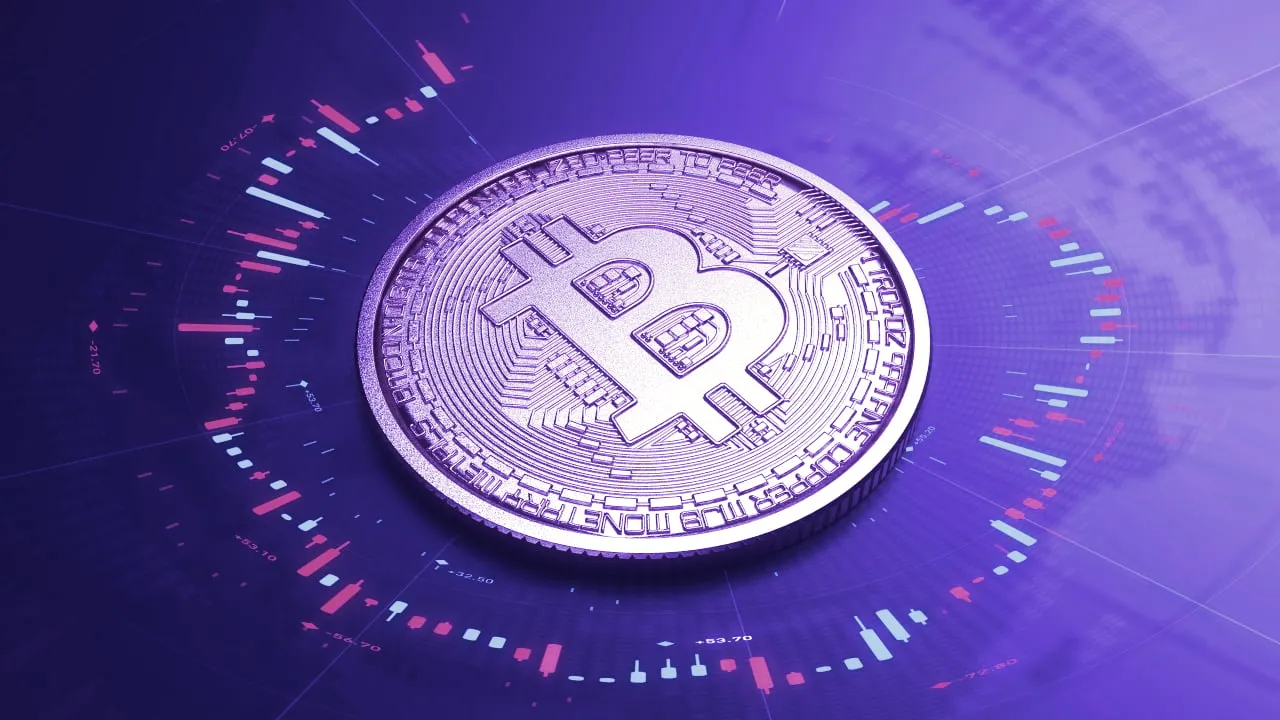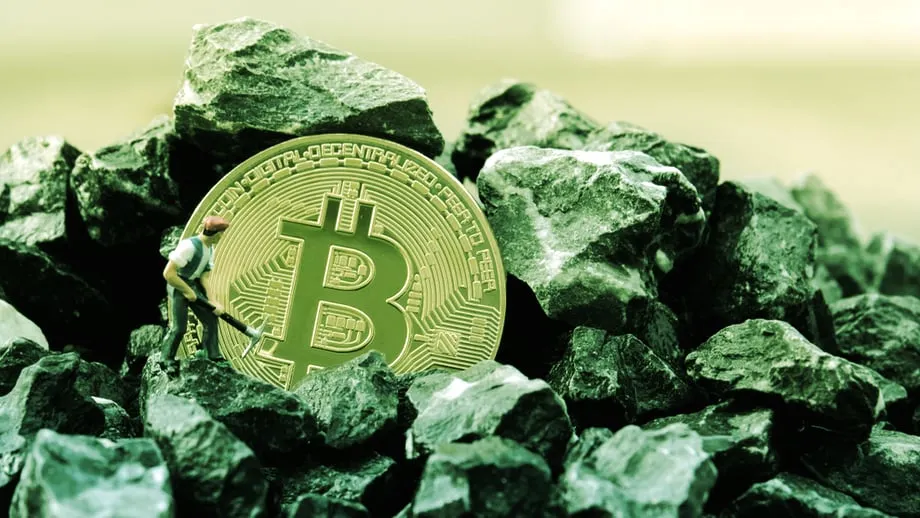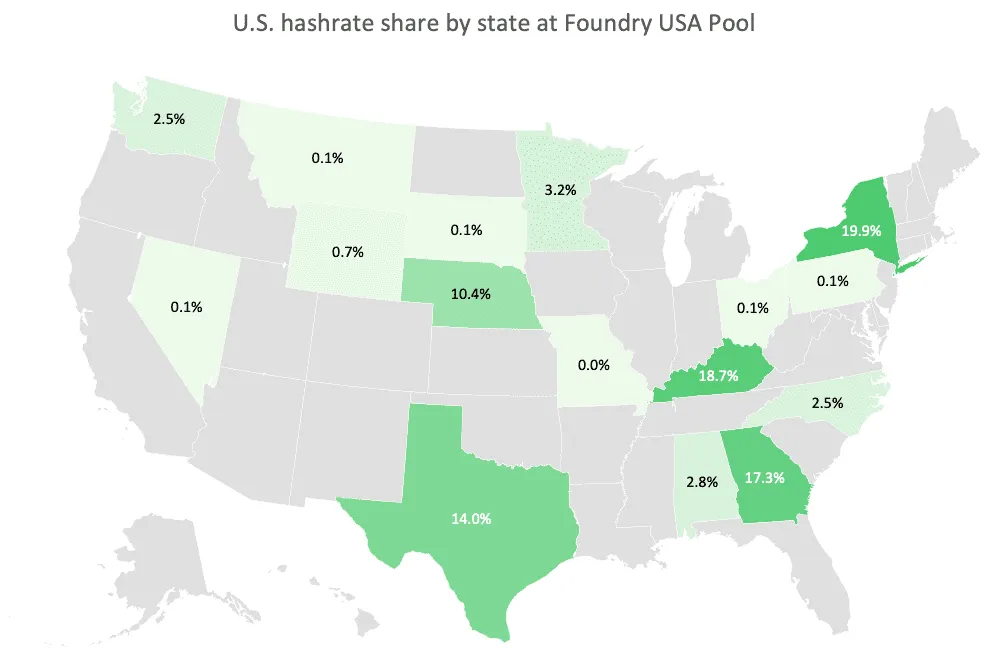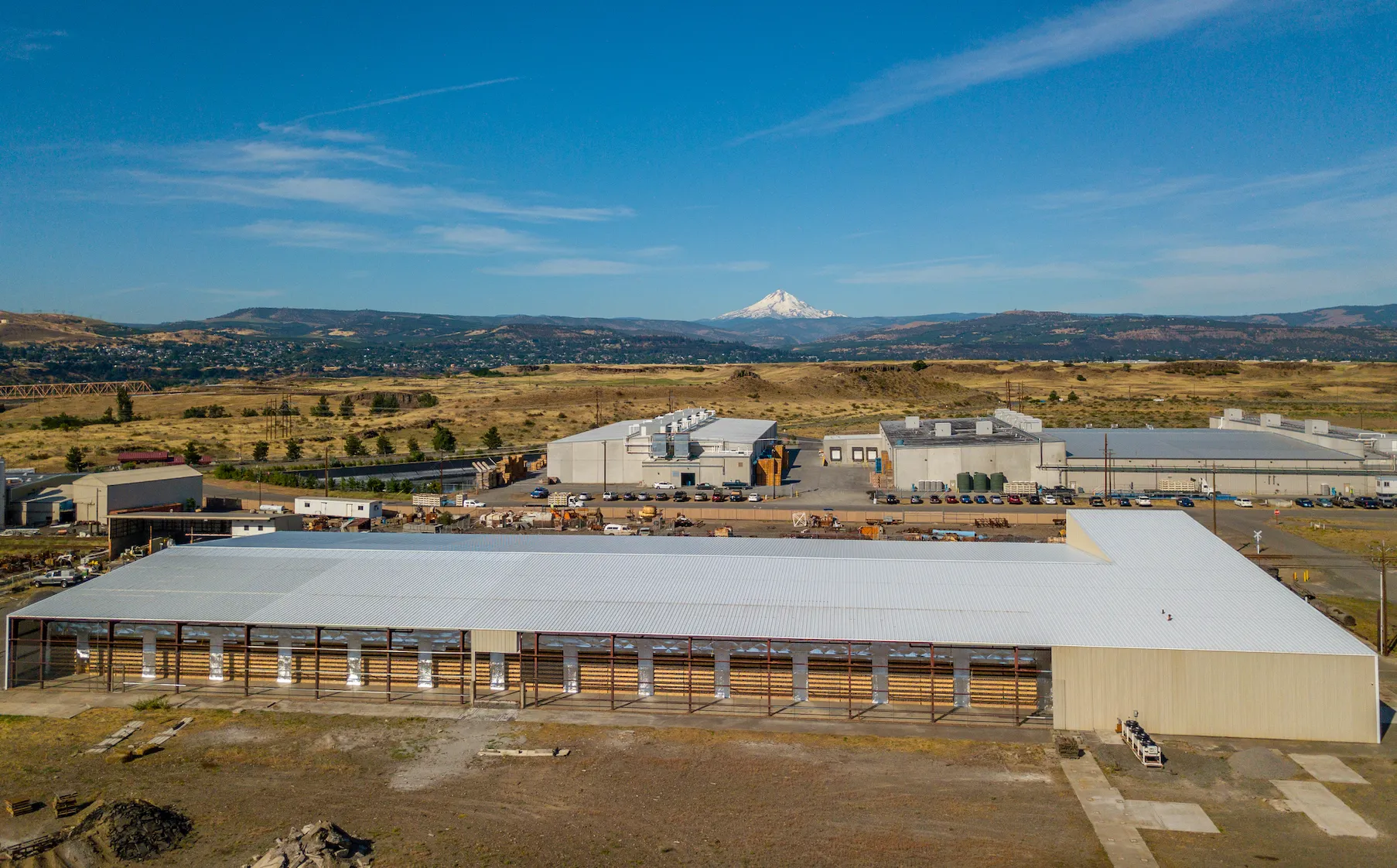Bitcoin Mining 'Is a Perfect Battery': Why Foundry Insists Green Activists Are Wrong
 Bitcoin is the crypto market's leading coin. Image: Shutterstock
Bitcoin is the crypto market's leading coin. Image: Shutterstock
In brief
- Bitcoin mining's migration to North America has raised scrutiny of its environmental impact.
- Mining giant Foundry claims the industry is accelerating a move to renewables.
- The issue has become hot enough to merit a hearing in Congress.
When Congress meets on Thursday to discuss the environmental impact of cryptocurrency, it will highlight a growing problem for Bitcoin miners: the perception, fair or not, that they are a menace to the planet.
One company that will be watching closely is Foundry, a Digital Currency Group subsidiary whose network of Bitcoin mining machines has quietly become one of the two biggest in the world, the other being China's Antpool; volume varies from week to week.
Foundry is an American success story, helping its customers rake in thousands of Bitcoins and helping repatriate a growing industry to U.S. shores. But the growing environmental scrutiny could mean Foundry's future depends on persuading governments and the public to accept a novel and contentious proposition: that crypto mining will play a key role in ushering in an era of renewable energy.
Bringing Bitcoin back home
Bitcoin is a borderless technology, but got its start in the U.S. The first to use it were Bay Area cryptographers, including the coder and Satoshi-confidante Hal Finney, who mined it on home computers. In those early days, many Americans mined Bitcoin on their own—sometimes on cell phones—or started companies to mine it at scale.
By 2015, however, the popularity of Bitcoin meant that anyone who hoped to mine new coins on a regular basis required machines with specialized chips, known as ASICs, dedicated to that purpose. And as with so many other computer components, Asian companies became the ones to make them.
China, in particular, dominated not just the manufacture of Bitcoin "rigs" but also the use of them; Chinese mining pools for years raked in the lion's share of newly mined Bitcoins. Then in 2020, the North American miners who still held on to about a 15% share of the market got a boost when Foundry entered the field.
What Will Happen to Bitcoin After All 21 Million are Mined?
There will only ever be 21 million Bitcoins. That’s it. Once they’re all mined, which should occur in around 2140, no new Bitcoins will enter circulation. The Bitcoin blockchain was designed around the principle of controlled supply, which means only a fixed number of newly minted Bitcoin can be mined each year until a total of 21 million coins have been minted. Once all 21 million BTC have been mined, the network will largely operate the same as it does now, but with one crucial difference for...
Foundry enjoys the backing of DCG, which also owns Grayscale Investments, Genesis Trading, and CoinDesk. DCG's deep-pocket owner Barry Silbert has said he is operating DCG's new mining venture on a decades-long horizon.
After mining a handful of Bitcoins with its own rigs in 2020, Foundry switched to a federated model the next year, supplying financing and machines to Bitcoin companies across the U.S. The company also created a pool for U.S. miners to share rewards (a long-standing practice in crypto mining) and pledged guaranteed returns to those who joined it.
Then Foundry and other U.S. miners, including publicly-traded Marathon and Riot Blockchain, got a stroke of luck: China cracked down harder on mining in the spring of 2021, driving nearly all miners out of the country. The result is that some a majority of Bitcoin mining now happens in North America. Meanwhile, Foundry helped Asian miners with the difficult logistics of transferring their machines—and sometimes their entire operations—to U.S. shores.
So far this year, Foundry's network has already mined 2,826 Bitcoins, or an average of 157 per day. Based on Bitcoin's recent price low of around $40,000, that translates to a daily average of $6.3 million in earnings—a figure that would be closer to $10 million per day if Bitcoin bounces back to its recent high around $68,000.
Most of this money, until recently, would have gone into the pockets of Chinese companies. Now, it is American investors and operators who are reaping the Bitcoin bonanza and ensuring that, like in crypto's early days, the bulk of crypto wealth is staying in the United States and Canada.
This would be an unadulterated American success story if not for the growing environmental concerns about Bitcoin mining—concerns that were once muttered by a handful of green activists, but are now the subject of a hearing in the U.S. capitol.
The crypto advocates at the hearing are likely to emphasize that most newer crypto projects, such as Solana or Tezos, use only a tiny fraction of the power used by Bitcoin since they don't require a "proof of work" system to update their blockchains. (The second-biggest cryptocurrency, Ethereum, is expected to move away from proof of work later this year).
That's not the case for Bitcoin, which has no plans to abandon proof of work, even as it remains the biggest blockchain in terms of economic value and power consumption. That status means that those who mine Bitcoin are likely to be singled out by environmentalists and lawmakers.
The Hard Truth About Bitcoin's Energy Consumption
Bitcoin recently broke $60,000 for the first time, cementing its perch as the “big dog” of cryptocurrencies. It has been embraced by groups as disparate as politicians, NFL stars, and Tesla CEO Elon Musk. And the fact that cryptocurrency is entirely digital makes it sound, in theory, as though it would be the greenest currency the world has ever seen. After all, unlike paper money, no trees have to be cut down to create Bitcoin. But people and press have become increasingly concerned about whe...
A ban on Bitcoin mining?
Most crypto enthusiasts regard Bitcoin as a marvelous new technology that spreads wealth and financial inclusion across the world. Critics view it differently. They see it as an environmental catastrophe—a computer network that guzzles more energy every year than the entire country of Argentina and that serves no useful purpose beyond enriching selfish libertarians.
In recent months, the critics have had momentum on their side. Their complaints have translated into a bill in New York state (which accounts for 20% of U.S. Bitcoin production) to ban crypto mining. The industry is faring no better in Europe, where a Swedish push to outlaw Bitcoin mining is gaining steam. Meanwhile, a key financial regulator has proposed implementing a similar ban across the continent.
The industry is faring no better in Europe, where a Swedish push to outlaw Bitcoin mining is gaining steam. Meanwhile, a key financial regulator has proposed implementing a similar ban across the continent.
The Bitcoin community has mostly reacted to its critics with indignation, framing their complaints as ill-informed and driven by spite, and pointing out that the traditional finance industry likewise guzzles immense amounts of energy. Such knee-jerk rebuttals are unlikely to deflect environmental scrutiny, and Foundry and other U.S. miners will need a better narrative to rebut the green lobby.
Foundry's CEO Mike Colyer thinks he has one. He and other Foundry executives tell Decrypt that Bitcoin mining is helping build a bridge that will help the U.S. accelerate its transition from fossil fuels to renewable sources of energy.
Colyer points to Texas, which is trying to build out its solar energy capacity after an unreliable grid plunged millions into darkness last winter. He notes that Foundry and its partners are signing deals with solar and hydroelectric providers, or sometimes buying them outright, to purchase large quantities of power. Bitcoin mining operation in Washington run by Scate Ventures, a Foundry partner. (Photo: Scate Ventures)
Bitcoin mining operation in Washington run by Scate Ventures, a Foundry partner. (Photo: Scate Ventures)
According to Colyer, pledges by Bitcoin companies to purchase power can tilt the balance when it comes to utilities deciding whether or not to build a solar station or other type of renewable energy plant. Bitcoin mining, he says, "has becomes a powerful flywheel for renewables. It's a path to a renewable energy future."
Colyer adds that mining companies can also help with "load balancing," or drawing energy during off-peak hours when utilities have a surplus. In practical terms, this means a Texas utility might provide the bulk of its capacity to Houston residents cranking their AC during an afternoon heatwave, and then supply power to Bitcoin companies at night when temperatures cool off.
Foundry is already in talks with Texas power companies that have progressed "beyond the learning phase," says Colyer, though he declined to specify which ones, saying the companies are wary about publicizing the initiatives.
This reluctance is likely the result of hard lessons learned during the Bitcoin boom of 2017 when fly-by-night companies promised a Bitcoin bonanza to public utilities across the U.S., but then vanished when prices collapsed—sometimes leaving damage and environmental degradation in their wake.
The current mining boom is different, according to Colyer, who says Foundry and its parent company are here for the long term and have always taken care to mind regulators and maintain a positive reputation.
There Will Be Bitcoin: Oil, Gas and a Cash Cow Under Our Feet
In a joint letter last week, Royal Dutch Shell and British Petroleum, two of the largest oil companies by revenue, encouraged Texas regulators to end natural gas flaring, the routine yet environmentally harmful practice of burning off excess gas that can’t be economically captured or transported. As it turns out, Bitcoin mining might be the way to finally kill the practice. A recent partnership between multinational oil giant Equinor and bitcoin mining firm Crusoe Energy Systems shows how captur...
Colyer isn't the only one who claims the North American mining industry has evolved. John Warren, the CEO of a smaller mining firm called Gem that is backed by hedge funds and family offices, makes similar arguments.
"Green power is a more and more important aspect of mining," says Warren, adding that many people fail to understand that mining operations in North America are much cleaner than those in places like Kazakhstan, another hub of crypto production.
Warren notes that 91% of the energy powering Gem's Bitcoin rigs is drawn from renewable sources. In the case of Foundry, the company says that number is 71% while the rest of its network's energy comes from oil, natural gas, and coal.
Even though the energy mix for Bitcoin mining in North America is considerably cleaner than elsewhere, the fact that dirty fuel like coal is powering any crypto operations is unlikely to sit well with environmentalists—indeed, a fossil fuel operation on Seneca Lake in upstate New York has created negative headlines around the world.
Foundry's claim that Bitcoin mining is accelerating a transition to renewables may allay some of these concerns. But not everyone is convinced its theory holds up.
Balancing profits and the environment
Alex de Vries is a researcher at the University of Amsterdam whose website Digiconomist has become an influential voice in the debate over the environmental impact of cryptocurrency. In an interview with Decrypt, he claimed the "bridge to renewables" thesis put forth by Foundry and others is not persuasive.
According to de Vries, miners' "load balancing" argument—that they won't burden energy grids by drawing power primarily in off-peak hours—is improbable given the economics involved with running a Bitcoin rig. He points out that miners are in a race against time since the chips in a rig typically become obsolete within 18 months, which means miners have a strong incentive to run the rigs around the clock.
"If you own one of these machines, the last thing you want to do is shut down," he says. "You have to ensure you make your profit before that happens."
And de Vries is skeptical that Bitcoin miners can be a significant spur for developing new renewable power stations. The problem, he says, is that constructing a new power facility takes time—something that miners rushing to deploy their rigs cannot afford.
More broadly, de Vries says he and others—including the environmentalists pushing for an outright ban on Bitcoin mining in Sweden—question whether the benefits of Bitcoin are adequate to justify expanding any renewable energy. Others raising this question include Steve Wright, who manages hydroelectric dams in the Pacific Northwest.
"When you have a green supply of power and you have a carbon-challenged world, people were asking if this is the best use of that power," Wright told me in a 2020 interview.
For Foundry and millions of Bitcoin boosters around the world, the answer to Wright's question is an unequivocal yes. To them, Bitcoin mining not only provides benefits in terms of the financial network it offers, but also acts as an important catalyst for expanding the total supply of renewables.
"Bitcoin mining is the path forward to a renewable future," according to Kevin Zhang, a VP at Foundry. "It is a perfect battery."
The Foundry executives are convinced their argument is the right one. It remains to be seen if U.S. policymakers will agree.





























![[ℕ𝕖𝕧𝕖𝕣] 𝕊𝕖𝕝𝕝 𝕐𝕠𝕦𝕣 𝔹𝕚𝕥𝕔𝕠𝕚𝕟 - OM(G) , My Biggest Bag Was A Scam????](https://cdn.bulbapp.io/frontend/images/99de9393-38a8-4e51-a7ab-a2b2c28785bd/1)
















